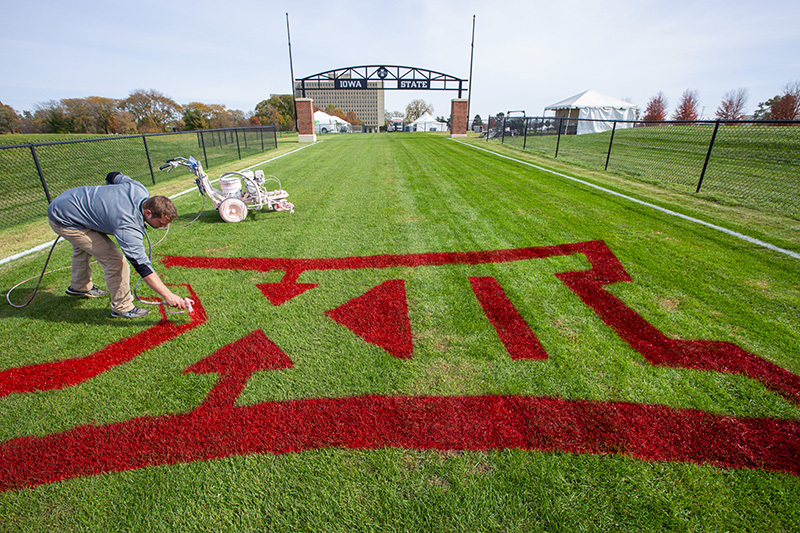For student Lauren Berglund, attending classes in Parks Library posed struggles many people may never have considered.
Berglund, a senior in child, adult and family services, is blind, has multiple chronic illnesses and uses a service dog. Until the library's new single-user restrooms opened this fall, the nearest restroom she could use was at The Hub.
Disability Awareness Week
Held annually to educate the Iowa State community about access barriers individuals with disabilities face, Disability Awareness Week will feature a series of events Oct. 29-Nov. 2. Two events specifically targeting faculty and staff are the weeklong interactive art exhibit in the Parks Library lobby and a Nov. 1 panel on student accommodations (12:30-1:30 p.m., MU Cardinal Room).
"This is the first time I've actually been able to safely and easily use the restroom in the library," said Berglund, co-president of the Alliance for Disability Awareness student organization. "It's been so nice."
The library bathroom project is one of many ways Iowa State has become more accessible in the past two years, both by upgrading facilities and technology and devoting more personnel to access issues.
Nora Ryan, inclusion services coordinator in the office of equal opportunity, assembled an inventory of recent accessibility improvements, which includes her own hire in spring 2017 for a new position that, in part, coordinates compliance with the Americans with Disabilities Act (ADA).
“This list demonstrates the university’s commitment to improving access for everyone,” Ryan said. “None of this would be possible without administrative and staff leadership and the dedication of numerous ISU community members. Because of everyone’s hard work, this list will continue to grow.”
The accessibility initiatives and improvements Ryan compiled include the following:
Personnel
- The university committee on disabilities has reconvened for monthly meetings and special projects after a seven-year hiatus.
- University Library created a full-time position held by assistant dean for inclusion and equity Susan Vega Garcia, who is tasked in part with supervising the library’s ADA coordination.
- Facilities planning and management (FPM) created an accessibility coordinator role held by Kerry Dixon, who also is a project manager and coordinator of sustainable design and construction.
- In an initiative to improve the accessibility of its digital media, ISU Extension and Outreach hired two new document accessibility specialists to remediate access issues in its nearly 2,500 online publications.
- The student accessibility services (SAS) office, which handles disability accommodations for students, created the sensory services coordinator position held by Megan Johnson. She coordinates accommodations for individuals across campus who are deaf or hard of hearing, as well as students who are blind or have low vision.
- Psychology professor Carolyn Cutrona was appointed to a new half-time role as an associate dean in the Graduate College, where she will handle accommodations for graduate assistants. Ryan said that is sometimes delicate because different offices administer accommodations for students and employees, but graduate assistants are both.
- Informational technology services is hiring a digital accessibility coordinator to manage efforts for barrier-free computing, resources and systems.
Facilities
- A two-year renovation project set to conclude next year is adding accessible restrooms in the library, including a single-user, gender-inclusive restroom on every floor.
- FPM is developing a facilities access improvement plan which will identify and prioritize accessibility issues on campus. The maintenance improvement committee has allocated funding to help address items identified in the facilities access improvement plan.
- A renovation this summer at Stephens Auditorium tripled the space available for theater guests who use wheelchairs.
- Technology upgrades in 10 general university classrooms this summer, funded by the computation advisory committee, included the addition of assistive listening connectivity.
- The parking division conducted a large survey of accessible parking under its management and is working to add medical stalls, beyond what is required by the ADA, in select locations.
Technology
- Printing and copy services purchased a flatbed inkjet printer and a complementary cutter/router machine to improve signage across campus.
- SAS launched a database called Accommodate for coordinating and facilitating student accommodations.
- The equal opportunity office created an online tool for reporting access barriers on campus.

